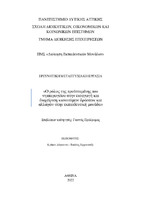Ο ρόλος της προϊσταμένης του νηπιαγωγείου στην εισαγωγή και διαχείριση καινοτόμων δράσεων και αλλαγών στην εκπαιδευτική μονάδα
The role of the kindergarten principal in introducing and managing innovative activities and changes to the educational unit

Μεταπτυχιακή διπλωματική εργασία
Author
Τσώλης, Εμμανουήλ
Κρίκου, Δέσποινα
Date
2022-07-12Advisor
Yannas, ProdromosKeywords
Προσχολική εκπαίδευση ; Σχολική καινοτομία ; Προϊσταμένη νηπιαγωγείου ; Ηγεσία ; Διευθυντές σχολικών μονάδων ; Διευθυντής ; Ηγέτης ; ΚαινοτομίαAbstract
Οι προκλήσεις του 21ου αιώνα απαιτούν ένα σχολείο ανοιχτό, ευέλικτο, συνεχώς εξελισσόμενο, καινοτόμο, το οποίο προσαρμόζεται στα νέα δεδομένα που ορίζει η ψηφιακή εποχή και ψηφιακή κοινωνία. Καθοριστικό ρόλο στην υποστήριξη και προώθηση της σχολικής καινοτομίας διαδραματίζει ο διευθυντής/ προϊστάμενος/ηγέτης. Αυτός θα καθορίσει την πορεία, την ποιότητα και τον βαθμό καινοτομίας και σε συνεργασία με τους υφιστάμενους εκπαιδευτικούς θα επιχειρήσουν να εφαρμόσουν τις αλλαγές στη σχολική μονάδα. Ωστόσο, η επιτυχία του όλου εγχειρήματος θα κριθεί από την αποτελεσματικότητα, τις ηγετικές ικανότητες, τις προσωπικές δεξιότητες και τα χαρακτηριστικά της προσωπικότητας του διευθυντή/ προϊστάμενου/ηγέτη.
Σκοπός της παρούσας εργασίας είναι η διερεύνηση των απόψεων τεσσάρων προϊσταμένων νηπιαγωγείων σχετικά με την εφαρμογή καινοτόμων εκπαιδευτικών ή διοικητικών προγραμμάτων στις σχολικές τους μονάδες. Μέσα από τις απόψεις τους
θα επιχειρήσουμε να αναλύσουμε την υφιστάμενη κατάσταση σχετικά με τον βαθμό και την έκταση εφαρμογής καινοτόμων εκπαιδευτικών ή διοικητικών πρακτικών στα ελληνικά νηπιαγωγεία. Η έρευνα διεξήχθη στο νομό Αττικής και ακολούθησε την
ποιοτική προσέγγιση συλλογής δεδομένων, μέσω των συνεντεύξεων των τεσσάρων προϊσταμένων νηπιαγωγείων.
Abstract
21st century challenges require a school environment that is open, flexible, continuously evolving, and innovative; a school that is able to adapt under the new given circumstances, as these are shaped in the digital era and digital society. In this kind of school, the figure who plays a definitive role in the advocacy and promotion of school innovation is the school principal/headteacher/leader. This person is the one to define the course, quality, and level of innovation and, in collaboration with the subordinate teachers, will attempt to implement changes within the school unit. However, the success of this whole project will be assessed on the basis of the efficacy, leadership skills, personal skills, and personality traits of the principal/headteacher/leader. The purpose of this thesis is to investigate the perspectives of four kindergarten principals regarding the implementation of innovative educational or administrative programs within the school units. Through their viewpoints, we shall attempt to analyze the current situation in terms of the degree and extent of the implementation of innovative educational or administrative programs in Greek kindergartens. The research questions raised fall within three subject areas: - Views on the concept of innovation, types and features of innovative actions which are implemented in kindergartens, concerning teaching and administration. - Facilitating and impeding factors regarding the introduction and implementation of innovative practices in Greek kindergartens. - Leaders’ traits and skills that pertain to the management of innovative actions. The research was conducted in the prefecture of Attika and the qualitative approach consisted of interviews with four kindergarten principals during the period of February- March 2022. The sample was selected by the researchers through the process of purposive sampling, so that the requirement of the collection of ample data would be met. It can be deduced from the results of the first research question that the principals of kindergarten consider school innovation as a novelty that serves the learning and educational goals of kindergarten and that principals are involved in varying degrees through the implementation of innovative programs. Despite the great interest in participating in such programs, these people follow a different implementation approach, while there is a pervasive exhaustion/burn-out that discourages them from
any further involvement in new actions. As for the second research question, though they are faced with numerous adversities (e.g. lack of staff, underfunding), when innovative actions are implemented they are proven to be effective, creative and innovative. Finally, concerning the third research question, there seems to be some confusion regarding the terms “leader-leadership”. Nevertheless, all four principals of the kindergarten operate as leaders. In fact, they mostly adopt the moral, participatory,
transformative type of leadership.

